| Listing 1 - 9 of 9 |
Sort by
|
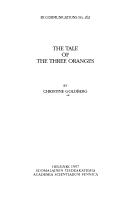
ISBN: 9514108116 9789514108112 Year: 1997 Volume: 263
Abstract | Keywords | Export | Availability | Bookmark
 Loading...
Loading...Choose an application
- Reference Manager
- EndNote
- RefWorks (Direct export to RefWorks)
Three oranges (Tale) --- Fairy tales --- Classification. --- Themes, motives. --- Three oranges (Tale). --- Classification --- Folk literature --- Themes, motives --- Three Oranges (Tale) --- Fairy tales - Classification. --- Fairy tales - Themes, motives.
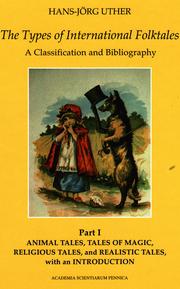
ISBN: 9514109562 9514109627 9514109643 9514109554 9514109619 9514109635 9789514109560 9789514109645 9789514109638 9789514109614 9789514109553 9789514109621 Year: 2004 Volume: 284-286 Publisher: Helsinki: Suomalainen tiedeakatemia,
Abstract | Keywords | Export | Availability | Bookmark
 Loading...
Loading...Choose an application
- Reference Manager
- EndNote
- RefWorks (Direct export to RefWorks)
Contes -- Classification --- Tale type indexes --- Tales -- classification --- Tales classification --- Verhalen -- Classificatie --- Verhalen [classificatie van ] --- Folklore --- Tales --- Classification --- Themes, motives --- History and criticism --- #VCV monografie 2005 ruil --- Classification. --- Themes, motives. --- Fairy tales --- Bibliography --- Folklore - Classification --- Folklore - Themes, motives --- Folklore - Bibliography --- Tales - History and criticism - Bibliography --- Contes --- Thèmes hagiographiques --- Lieux communs
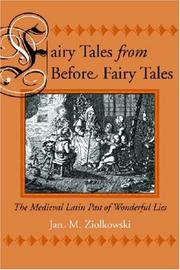
ISBN: 9780472115686 0472115685 Year: 2007 Publisher: Ann Arbor, Mich. University of Michigan Press
Abstract | Keywords | Export | Availability | Bookmark
 Loading...
Loading...Choose an application
- Reference Manager
- EndNote
- RefWorks (Direct export to RefWorks)
When did fairy tales begin? What qualifies as a fairy tale? Is a true fairy tale oral or literary? Or is a fairy tale determined not by style but by content? To answer these and other questions, Jan M. Ziolkowski not only provides a comprehensive overview of the theoretical debates about fairy tale origins but includes an extensive discussion of the relationship of the fairy tale to both the written and oral sources. Ziolkowski offers interpretations of a sampling of the tales in order to sketch the complex connections that existed in the Middle Ages between oral folktales and their written equivalents, the variety of uses to which the writers applied the stories, and the diverse relationships between the medieval texts and the expressions of the same tales in the "classic" fairy tale collections of the nineteenth century. In so doing, Ziolkowski explores stories that survive in both versions associated with, on the one hand, such standards of the nineteenth-century fairy tale as the Brothers Grimm, Hans Christian Andersen, and Carlo Collodi and, on the other, medieval Latin, demonstrating that the literary fairy tale owes a great debt to the Latin literature of the medieval period. Jan M. Ziolkowski is the Arthur Kingsley Porter Professor of Medieval Latin at Harvard University.
Folklore --- Fiction --- sprookjes --- Fairy tales --- Tales --- History and criticism --- History and criticism. --- Classification. --- Contes de fées --- Contes --- Histoire et critique --- Classification --- Tale type indexes --- Fairy tales - History and criticism --- Tales - Classification --- Children's literature. Juvenile literature --- jeugdliteratuur
Book
ISBN: 9782020005876 2020005875 Year: 2007 Volume: 12 Publisher: Paris: Seuil,
Abstract | Keywords | Export | Availability | Bookmark
 Loading...
Loading...Choose an application
- Reference Manager
- EndNote
- RefWorks (Direct export to RefWorks)
Parue en 1928, la "Morphologie du conte" est à l'analyse structurale du récit ce que le cours de Saussure est à la linguistique: la source d'inspiration. Cent contes de fées russes permettront à Propp d'identifier une matrice dont tous les autres sont issus. Reconnaissant en lui son précurseur, Lévi-Strauss évoque "son immense mérite" et "ses intuitions prophétiques". La présente traduction est la première à suivre l'édition russe définitive de 1969; s'y ajoute une étude complémentaire de Propp: " les transformations des contes merveilleux" ; et un essai de E.M. Mélétinski qui recense les échos suscités par ce livre dans le monde entier. Quatrième de couverture.
Littérature --- Ecriture --- Mythologie --- Symbolique --- Sémiologie --- Fairy tales - Classification --- Conte --- Fairy tales --- Classification. --- Myth in literature --- Contes de fées --- Mythe dans la littérature --- Classification --- History and criticism --- Histoire et critique --- Meletinskiĭ, E. M. --- Contes --- Recit, analyse du --- Contes russes
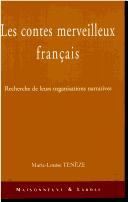
Abstract | Keywords | Export | Availability | Bookmark
 Loading...
Loading...Choose an application
- Reference Manager
- EndNote
- RefWorks (Direct export to RefWorks)
Analyse du discours narratif --- Contes -- Classification --- Discours narratif -- Analyse --- Discourse analysis [Narrative ] --- Narratieve teksten -- Tekstgrammatica --- Narrative discourse analysis --- Tale type indexes --- Tales -- classification --- Tales classification --- Teksten [Narratieve ] -- Tekstgrammatica --- Teksten [Verhalende ] -- Tekstgrammatica --- Textes narratifs -- Analyse du discours --- Verhalen -- Classificatie --- Verhalen [classificatie van ] --- Verhalende teksten -- Tekstgrammatica --- Tales --- Contes --- Classification --- History and criticism --- Histoire et critique --- France --- Theory, etc. --- Fairy tales --- Folklore --- Structural analysis --- History and criticism. --- Tales - France - History and criticism
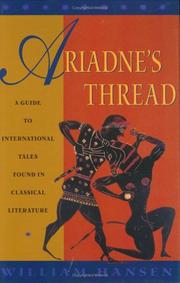
ISBN: 0801436702 9780801436703 Year: 2002 Publisher: Ithaca (N.Y.): Cornell university press
Abstract | Keywords | Export | Availability | Bookmark
 Loading...
Loading...Choose an application
- Reference Manager
- EndNote
- RefWorks (Direct export to RefWorks)
Tales --- Folk literature --- Classical literature --- Classification. --- Classical influences. --- History and criticism. --- Classification --- Oral literature --- Folklore --- Literature --- Tale type indexes --- History and criticism --- Classical influences --- Tales - Classification. --- Folk literature - Classification. --- Folk literature - Classical influences. --- Folk literature - History and criticism. --- Classical literature - History and criticism.
Book
ISBN: 9514101324 9789514101328 Year: 1973 Volume: 184 Publisher: Helsinki Suomalainen Tiedeakatemia
Abstract | Keywords | Export | Availability | Bookmark
 Loading...
Loading...Choose an application
- Reference Manager
- EndNote
- RefWorks (Direct export to RefWorks)
Fairy tales --- Tales --- Classification --- Bibliography --- 398.2 --- 82-34 --- Volksverhalen. Sprookjes. Sagen. Legenden. Kluchten --- Sprookje. Legende. Mythe --- Folk literature --- Folk tales. --- Folklore --- Bibliography. --- Classification. --- Themes, motives. --- 82-34 Sprookje. Legende. Mythe --- 398.2 Volksverhalen. Sprookjes. Sagen. Legenden. Kluchten --- Fairy tales - Classification --- Fairy tales - Bibliography --- Tales - Bibliography
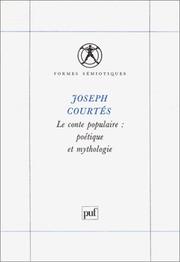
ISBN: 2130391036 9782130391036 Year: 1986 Volume: vol *16 Publisher: Paris
Abstract | Keywords | Export | Availability | Bookmark
 Loading...
Loading...Choose an application
- Reference Manager
- EndNote
- RefWorks (Direct export to RefWorks)
Folklore --- Fiction --- Literary semiotics --- Fairy tales --- Tales --- Contes de fées --- Contes --- History --- History and criticism --- Classification --- Structural analysis --- Histoire --- Histoire et critique --- Analyse structurale --- 398.2 --- -Fairy tales --- -Tales --- -#SBIB:309H507 --- Folk tales --- Folktales --- Folk literature --- Fairytales --- Children's stories --- Volksverhalen. Sprookjes. Sagen. Legenden. Kluchten --- Code en boodschap: narrativiteitstheorie --- History and criticism. --- 398.2 Volksverhalen. Sprookjes. Sagen. Legenden. Kluchten --- Contes de fées --- #SBIB:309H507 --- Themes, motives --- Types --- Sprookjes --- Contes populaires --- Volksverhalen. --- Fairy tales - History and criticism --- Fairy tales - France - History and criticism --- Fairy tales - Classification --- Tales - Structural analysis
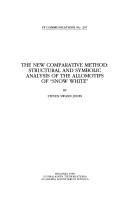
ISBN: 9514105974 9789514105975 Year: 1989 Volume: 247 Publisher: Helsinki Academia scientiarum Fennica
Abstract | Keywords | Export | Availability | Bookmark
 Loading...
Loading...Choose an application
- Reference Manager
- EndNote
- RefWorks (Direct export to RefWorks)
Snow White (Tale) --- Fairy tales --- Folklore --- History and criticism. --- Classification. --- Structural analysis. --- -Folklore --- -Folk beliefs --- Folk-lore --- Traditions --- Ethnology --- Manners and customs --- Material culture --- Mythology --- Oral tradition --- Storytelling --- Fairytales --- Children's stories --- Tales --- Classification --- Structural analysis --- -Classification --- -Little Snow White (Tale) --- Little Snowdrop (Tale) --- Magic Mirror (Tale) --- Snow White and the Seven Dwarfs (Tale) --- Snowdrop (Tale) --- Snowdrop and the Seven Dwarfs (Tale) --- Snowwhite and the Seven Dwarfs (Tale) --- Little Snow White (Tale) --- Structural analysis (Folklore) --- Structuralism (Folklore analysis) --- Structural anthropology --- History and criticism --- Methodology --- Themes, motives --- Types --- Snow White (Tale) - History and criticism. --- Fairy tales - Classification. --- Folklore - Structural analysis.
| Listing 1 - 9 of 9 |
Sort by
|

 Search
Search Feedback
Feedback About UniCat
About UniCat  Help
Help News
News